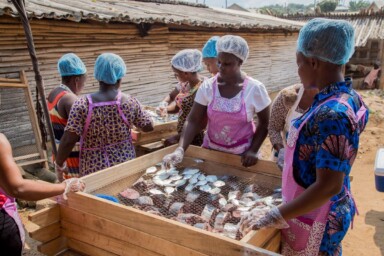In recent years increased awareness of poor labour and environmental standards in the banana industry has led European retailers to impose a rigorous certification process on their suppliers, reassuring consumers that their fruit is produced in a sustainable manner. Yet claims made by Ecuadorian banana plantation workers suggest that these certification schemes have weaknesses and are not having the desired impact on the ground. Rachel Smith set off to the plantations and packing plants of Ecuador to find out more
Lucia rolls up her sleeves to reveal arms covered in white spots. The 25 year old works in a banana packing plant owned by a big Ecuadorian exporter supplying the UK market, applying pesticides to the fruit after they have been harvested. She tells me that she has never been provided with equipment to protect her from these toxic chemicals, a flagrant violation of government regulations and international certification requirements.
Ecuadorian law entitles employees to 15 days of annual leave, but Lucia has yet to take a single day off. “Our supervisor told us that the company would start letting us take our paid holiday next year,” she says, clearly sceptical.
“I have never been paid for overtime but I work long hours every day,” she continues. When she finally plucked up the courage to ask her supervisor why, he retorted that if she didn’t want to work, she knew where the door was. A single mother with two young children to support, she decided that the best option was to keep quiet.
Lucia is far from alone. Ecuador is the world’s largest exporter of bananas. Some 2.5 million of the country’s workforce depend on the industry for their livelihood. The reality of daily life on the plantations, though, is a bleak one, and conditions for many workers remain deplorable.
International certification schemes have evolved to respond to market demands for ethical products. Banana exporters can no longer sell to the European market without being certified by GlobalGap, which requires them to adhere to a strict set of health, safety, environmental and labour codes. Retailers such as Tesco have gone even further, moving to work directly with their banana suppliers, “to ensure that our growers are operating to the highest ethical standards”. Britain’s largest supermarket has developed a scrupulous certification scheme that suppliers must comply with if they want their fruit to appear on the retail giant’s shelves.
Gaining international certification is time consuming and costly, but with 46% of Ecuador’s bananas destined for the European Union, many exporters are willing to do what it takes to maintain their market share. “The certification schemes have led to a lot of positive changes for the workers,” claims one Ecuadorian producer. “We had to make the packing plant safer, provide drinkable water and affiliate all our employees to the national social security scheme.”
Inspections of certified exporters are conducted once a year to ensure they continue to comply with the regulations. Company representatives claim that the inspectors are free to select which employees they wish to speak to, but workers tell me another story.
“I’d love to speak to an inspector,” says Lucia. “But since I confronted my boss about my salary, he sends me out of the packing plant every time there’s an inspection.”
“We are only given protective equipment on the day of an inspection,” says Ana, who works without a contract in a packing plant owned by another Ecuadorian company. “As soon as the inspectors have gone, everything goes back to normal,” she continues. “They should come to the plantations unannounced so that they can see how things really are.”
The claims made by workers clearly call the efficacy of international certification schemes into question, and the issue is made more complex by the common use of third-party suppliers. A considerable portion of Ecuador’s plantations is made up of relatively small-scale producers, and most cannot meet their export targets simply by using their own fruit. They fill the gap by purchasing bananas from smaller plantations, ones not subject to the same worries about certification because they are not selling direct to the European market. This makes any controls difficult to enforce.
Carlos has worked for one such third-party supplier for 10 years. The 55 year old has never been given a contract and has no entitlement to a state pension or national social security as a result. Planes regularly fly over the plantation where he works, raining down pesticides on the fruit while workers are in the fields – with no prior warning. “Sometimes the aerial spraying takes place at lunchtime,” he says. There is no covered canteen for the workers, and their food is contaminated as a result.
The plantation where Carlos works sells its fruit to an Ecuadorian exporting company with a strict social and ethical policy that aspires to Fairtrade certification. A visit to one of its plantations confirms that it practices what it preaches on its own land. Workers are provided with protective equipment, clean facilities and regular training. The owner encourages his supervisors to promote a respectful working environment. In a move to make women workers feel valued in this traditionally male-dominated industry, they are paid a higher salary than elsewhere in the sector. Carlos’s working conditions provide a stark contrast.
“My boss is a tyrant,” he says, not mincing his words. “But his brother is even worse. One of my colleagues once sat down to have a rest and within minutes he had a gun pointed at his head.”
Yet like countless other labourers who are employed informally, Carlos is not only left without security but also without a voice: with no contract he is not protected by employment law. The violation of workers’ rights remains endemic in many of Ecuador’s plantations. Workers have reported doing long hours with no overtime pay, women being dismissed when they become pregnant and frequent verbal abuse from supervisors.
By purchasing fruit from third-party suppliers who are subject to little or no control, large exporting companies are implicitly condoning illegal and repressive practices in their supply chain. International certification schemes do not provide a mechanism by which this can be prevented.
The story told by the employees of a plantation owned by one of the large fruit multinationals demonstrates that the real key to improving working conditions is constructive collaboration between workers and their employers.
Megabanana is one of only three plantations in the Ecuadorian banana industry with an independent trade union. On the plantation in question, the trade union has been instrumental in negotiating better conditions for workers, such as a monthly child allowance. Workers benefit from an onsite medical service and they receive overtime pay, paid holiday and all other benefits stipulated by the law. Aerial spraying of pesticides is never conducted during the working day.
This trade union is a member of the National Federation for Agro-Industrial Workers, Farmers and Free Indigenous People (FENACLE), which has been organising educational activities for workers for the past 12 years, with the support of the British non-governmental organisation Banana Link.
Employees claim that workshops on the themes of gender roles, self-esteem and leadership skills have transformed the atmosphere in the workplace. “There were a lot of arguments in the past,” says Clara. “Now we know how to treat each other, there is a respectful working environment.” She adds, “I feel good working here” – a comment rarely heard from a packing plant worker.
The workers at Megabanana have clearly benefited from the positive collaboration between the trade union and the company. Sadly, they are in the minority. A history of violent trade union repression in the Ecuadorian banana industry has resulted in a particularly low level of workers’ organisations in the sector. Membership of the existing associations is on the decline, with workers reluctant to be seen attending meetings for fear of losing their job. The recent dismissal of several trade union leaders confirms that their apprehension is justified. While Rafael Correa’s socialist government is striving to improve conditions in the industry, hostility to workers organising in defence of decent conditions and fair pay is deeply ingrained.
Unacceptable working conditions and trade union repression are far from unique to Ecuador. Low wages, poor health and safety standards, and violation of workers’ rights are endemic in producer countries throughout Latin America, Africa and Asia.
Banana Link is dedicated to working for more sustainable production of tropical fruit, improved conditions for workers and a shift towards less harmful environmental impacts. But unless more companies allow their workers to have a voice, bananas will continue to be produced in conditions that are far less sustainable than retailers have led consumers to believe.
All workers’ names have been changed and company names withheld to protect the identity of the workers.
For more information and resources, see www.bananalink.org.uk.






